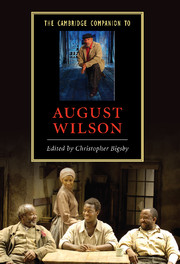Book contents
- Frontmatter
- 1 August Wilson: the ground on which he stood
- 2 Been here and gone
- 3 August Wilson’s relationship to black theatre: community, aesthetics, history and race
- 4 Music and mythology in August Wilson’s plays
- 5 Gem of the Ocean and the redemptive power of history
- 6 Joe Turner’s Come and Gone
- 7 Ma Rainey’s Black Bottom: cutting the historical record, dramatizing a blues CD
- 8 A piano and its history: family and transcending family
- 9 The tragedy of Seven Guitars
- 10 Safe at home?: August Wilson’s Fences
- 11 Two Trains Running: blood on the tracks
- 12 Jitney, folklore and responsibility
- 13 King Hedley II: in the midst of all this death
- 14 Radio Golf: the courage of his convictions - survival, success and spirituality
- 15 Critics on August Wilson
- 16 An interview with August Wilson
- Index
10 - Safe at home?: August Wilson’s Fences
Published online by Cambridge University Press: 28 January 2008
- Frontmatter
- 1 August Wilson: the ground on which he stood
- 2 Been here and gone
- 3 August Wilson’s relationship to black theatre: community, aesthetics, history and race
- 4 Music and mythology in August Wilson’s plays
- 5 Gem of the Ocean and the redemptive power of history
- 6 Joe Turner’s Come and Gone
- 7 Ma Rainey’s Black Bottom: cutting the historical record, dramatizing a blues CD
- 8 A piano and its history: family and transcending family
- 9 The tragedy of Seven Guitars
- 10 Safe at home?: August Wilson’s Fences
- 11 Two Trains Running: blood on the tracks
- 12 Jitney, folklore and responsibility
- 13 King Hedley II: in the midst of all this death
- 14 Radio Golf: the courage of his convictions - survival, success and spirituality
- 15 Critics on August Wilson
- 16 An interview with August Wilson
- Index
Summary
'Some people build fences to keep people out . . .
And other people build fences to keep people in.'
Jim Bono, FencesAugust Wilson was one of America's most gifted storytellers. His plays read like fiction, the narrative drive, symbolic settings, evocative stage directions, music, and characters themselves propelling the action with a sparkling performativity. This sense of storytelling is nowhere more evident than in Fences (1985). No wonder Lloyd Richards, who directed so many of Wilson's plays throughout their careers, suggested one year before its Broadway premiere, on 26 March 1987, at the Street 46th Theatre, that the playwright was 'one of the most compelling storytellers to begin writing for the theater in many years'. Following the success of his first Broadway play, Ma Rainey's Black Bottom (1984), Fences, which in 1987 won the Pulitzer Prize, the Tony Award and the New York Drama Critics' Circle Award, confirmed the arrival of a theatrical voice of genuine originality.
Fences concerns the lives of the Maxsons, an African American family whose struggles are chronicled from 1957 to 1965. The dates, of course, encompass a key period in the civil rights movement, but this was also the time in which Wilson was a teenager and high school student, and experienced the full force of white racism. Ostensibly a fairly straightforward domestic drama, Fences, by the final blackout, has expanded into an enabling fable of rebellion and recovery, of myth and history, and of confrontation and expiation. Asked two years before his death if he considered Fences his 'signature play', Wilson commented that that accolade would go to Joe Turner's Come and Gone (1986). But, most theatregoers and critics feel, Fences remains one of his finest achievements.
- Type
- Chapter
- Information
- The Cambridge Companion to August Wilson , pp. 135 - 144Publisher: Cambridge University PressPrint publication year: 2007
- 1
- Cited by

